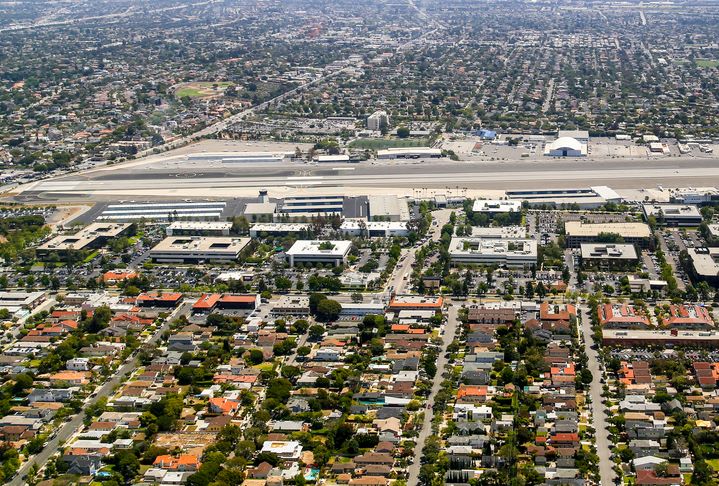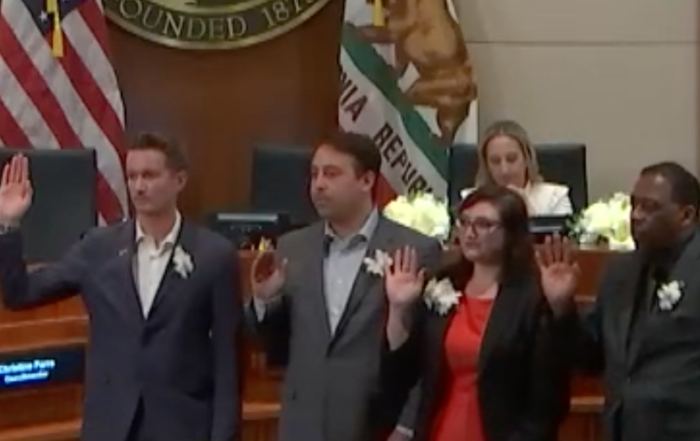Residents who support Santa Monica Airport’s closure and transition to a park have been quite vocal about an issue discussed Tuesday night by the city council: should a focus group of 40 Santa Monica residents, chosen at random, decide the future of the airport land after its closure at the end of 2028?
Almost everyone who spoke or wrote to the council was opposed, if not to the randomly selected panel, then certainly to the way city staff wrote the mission assigned to the eventual focus group. Most took issue with the following framing language:
“How should the diverse needs of our community inform the future of the Airport land and the balance of land uses and development, that will most effectively contribute to Santa Monica’s long‐term vitality?”
The opposition zeroed in specifically on the words “and development,” something they say violates the will of the voters to convert the land exclusively into a park.
Former Mayor Michael Feinstein spoke up for maintaining the integrity of Measure LC, the “Airport to Park” measure that Santa Monica voters passed in 2014. He is opposed to the random selection of residents being given an open mandate, saying, “I’m here to recommend you ask the city attorney to make the framing language specifically tied to the land use options as expressed in LC, and not this wide open potential economic development theory language that’s in the staff report.” He added, “There is no mandate for the city council to change the will of the voters in a roundabout way by using the lottery panel – which is an interesting model – but [you] can’t use that to rethink a decision that we already voted on with 60 percent.”
The idea for a citizen focus group selected by lottery sprung out of what city staff says was a charge given to them by the council itself. The Public Works Department’s Amber Richane, who presented the citizen lottery concept Tuesday evening, reminded the council that back in January, they asked her team to come back with “A robust community engagement process that will meet people where they are.” She also noted that the council further directed staff to return with “Non-traditional” methods of public outreach and to “think big” and “outside of the box.”
The group Richane and her team found through a thorough Request for Qualifications process and are recommending help run the resident lottery is Oregon-based nonprofit Healthy Democracy. The organization’s Program Co-Directors were on hand and called their process “Lottery Selected Panels.”
In concluding her remarks, Richane defended the framing language, saying “We’ve heard a lot of talk tonight about the words ‘and development,” she said. “We took the words from [Measure] LC. It literally says ‘land uses and development.’” But she said given the concerns from the community, the staff would be happy to strike the two words.
One of the questions the council will have to reconcile is whether a resident panel if they choose to move forward with one, would only include Santa Monica residents or would include West Los Angeles residents also fairly adjacent to the airport.
During questioning, Councilmember Phil Brock went after Healthy Democracy, aggressively questioning Co-Director Linn Davis, interrupting him several times as Davis tried to respond to Brock’s questions about the organization’s work and affiliations. Several members of the public have in recent weeks accused Healthy Democracy of having ties to developers because the organization has engaged with an advocate for more abundant housing stock.
Later, Brock lectured Richane about the trust the community has lost in the city’s commitment to ensuring the airport is turned strictly into a park.
“Where is that statement of fact that says we are committed to do what the voters of our city asked for; we’re committed to do what the Friends of Sunset Park and Ocean Park and Sunset Park – and all through this city – from Wilmont to NOMA to everyone?” asked an agitated Brock. He also more than once said the staff seemed to be trying to “sell” the idea of using Healthy Democracy and the lottery-selected panel.
To a point a speaker made about the council being familiar with them as Airport activists, Mayor Gleam Davis said, “That is exactly the problem,” in a nod toward bringing in new faces the way a randomly selected panel would do. Quoting former San Jose Mayor Sam Liccardo, she added, “The most important voices are the ones you never hear.”
“With all due respect, Councilmember Brock, you kept saying they are trying to ‘sell it.’” she added. “All they’re doing is sort of selling our own idea back to us.”
With questions concluded, Councilmember Caroline Torosis moved to strike “and development” from the framing question, to include two adjacent West L.A. residents to any selected panel, and to contract with Healthy Democracy to engage in the lottery panel process.
But Brock complained, among other things, about the cost of engaging Healthy Democracy. “I don’t understand why we’re considering this right now when we can’t take care of basic needs for the city,” he said, while also voicing his continued skepticism about Healthy Democracy as an organization.
Brock then proposed a substitute motion to return to a competitive bidding process among firms that wish to help guide the public input portion of the Airport planning process, but not to utilize a lottery-selected panel. After a few minutes of clarifying discussion, Brock altered his substitute proposal to be the city specifically engaging with Sasaki – an architectural design and planning firm that has already been identified to handle the technical work of the Airport transition – to also engage the public process.
Councilmember Jesse Zwick was opposed to moving backward, saying, “The thing that’s upsetting to me is we know for certain that our current system of outreach is broken.” He added, “We’ve heard consistently throughout the evening that the only system that people have now to engage is very self-selecting and limiting in terms of who actually does [participate].”
He affirmed that the staff has told the council several times that the people always most likely to engage are “Older, whiter, richer, and more likely to own a home.” He continued, “I think it would be really upsetting to go back on that innovative mission that I think we all share as a council.”
Zwick also accused the traditional neighborhood groups that normally participate of wielding “outsized power.” “There are certain groups that together – while they constitute a tiny percentage of people in our city, are used to being the primary voice in our town,” he said. “And, when confronted with a system that aims to broaden and diversify the representation on this panel, they opposed it – not because it will fail to do that, but because it will succeed.”
Despite Zwick’s plea, the council voted 4-3, to pass Brock’s substitute motion. Brock was joined by Councilmembers Christine Parra, Oscar De La Torre, and Lana Negrete. Zwick, Torosis, and Mayor Gleam Davis – who all favored the more inclusive Lottery Panel process, voted no.
Photo by mixmotive
Stay informed. Sign up for The Westside Voice Newsletter
By clicking submit, you agree to share your email address with Westside Voice. We do not sell or share your information with anyone.








